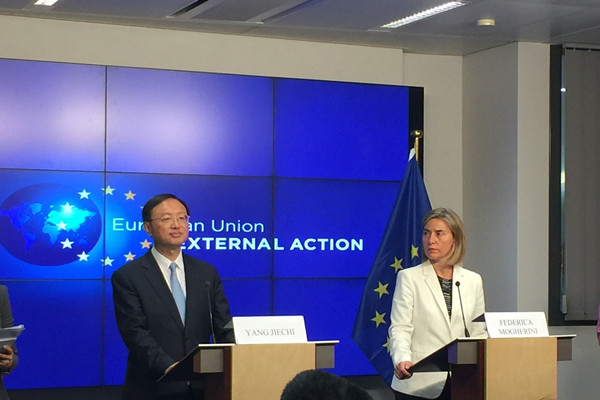 |
|
State Councilor Yang Jiechi and his EU counterpart Federica Mogherini vow to deepen the bilateral relationship at press conference of the sixth round of high-level strategic dialogue held in Brussels on Friday. [Photo by Fu Jing/chinadaily.com.cn] |
In the run-up to the G20 summit in Hangzhou, East China's Zhejiang province, in September, Chinese and European leaders will hold intensive talks to create more opportunities and space to boost their trade and other relations.
German Chancellor Angela Merkel is on her ninth visit to China with the aim of taking Sino-German relations to new heights. But despite China's advanced manufacturing power, which helped Germany to reap benefits by investing in the country for decades, Berlin is still hesitant to acknowledge China as a market economy.
As for the overall relationship between China and the European Union, the two sides have decided to hold their annual summit in July. The decision was taken at a high-level strategic dialogue co-chaired by State Councilor Yang Jiechi and High Representative of the EU for Foreign Affairs and Security Policy Federica Mogherini in Brussels on Friday. Besides, EU leaders, including European Commission President Jean-Claude Juncker, will meet with their Chinese counterparts at the Asia-Europe meeting in Mongolia in July and the G20 summit in September.
In addition to these meetings, the leaders of the United Kingdom and France are also expected to meet with their Chinese counterparts at bilateral and multilateral forums and meetings during the coming months.
It is notable that such meetings are being held so frequently despite the serious domestic challenges both sides face and the rising concerns over regional and global issues.
It is encouraging to see Chinese and European leaders adopting a pragmatic approach even though they have taken different stands on the serious issues of excess steel production and China's market economy status.
In 2012-13 Beijing and Brussels were locked in a dispute over exports of China-made solar panels to EU countries, following which high-level exchanges between the two sides were closed for almost one year. The resumption of the exchanges can thus be seen as a win-win compromise.
Some observers say the consultation approach adopted by the two sides should be used to resolve the steel trade dispute and determine how China can acquire market economy status.
For the EU and many of its member states, China has been their strategic partner. The essential elements of such a partnership are mutual trust, understanding and compromise. China has established such a relationship with the EU, which got a boost when Xi became the first Chinese president to visit the EU headquarters in 2014, in order to help restore global peace, and accelerate growth and reform.
China has offered to synergize Beijing-Brussels work on mega-projects by setting up joint funds to realize connectivity, and inject more capital into the EU's €315-billion ($350-billion) investment plan.
These commitments follow China's support to the EU during its deepest financial and sovereign debt crisis in 2008-09. Some EU member states, including the UK, Denmark, the Czech Republic and Greece, have responded positively to China's moves. But some others, especially the EU itself, have a lot of homework to do on how to further expand the strategic partnership.
The EU needs to meet the expectations of its member states, most of which are eager to deepen pragmatic relations with China. The EU should also expedite the decision-making process to realize mega-project synergy and facilitate connectivity in Eurasia.
Moreover, the EU should consider internal institutional reforms-turning its institutions into facilitators of pragmatic partnership, instead of working as stumbling blocks.
The author is deputy editor of China Daily European Edition. [email protected]

I’ve lived in China for quite a considerable time including my graduate school years, travelled and worked in a few cities and still choose my destination taking into consideration the density of smog or PM2.5 particulate matter in the region.